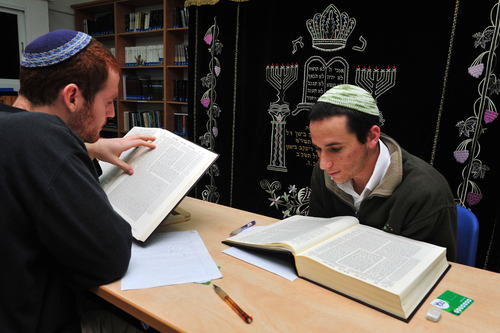The prohibition against studying Torah on Tisha B’av[1] is well known.[2] The primary reason for it is because we are not supposed to be happy on Tisha B’av, to say the least, and Torah study makes one happy, as it says, “The statutes of Hashem are upright, they make the heart rejoice.”[3] Another reason that Torah study is forbidden on Tisha B’av is in order that one’s mind not be distracted from the mourning that we are meant to be focused on.[4]
The Talmud cites two opinions as to exactly which areas of Torah may not be studied on Tisha B’av. According to Rav Meir, one is permitted to study all unfamiliar Torah texts on Tisha B’av, even if the content is not necessarily saddening. According to this approach, only familiar, non-saddening texts are forbidden to be studied on Tisha B’av. This is because studying unfamiliar texts is often accompanied by some level of frustration and is not immediately pleasurable. According to Rav Yehuda, however, all forms of Torah study are forbidden on Tisha B’av, unless it is saddening material. According to this approach, even new and unfamiliar texts are pleasurable.[5] The halacha is in accordance with this view.[6]
The Taz offers a fascinating explanation as to why even unfamiliar texts may not be studied on Tisha B’av even though doing so might be frustrating. He explains that there is both joy and frustration when studying new and difficult topics. The frustration is the result of the extra effort that is required in order to comprehend the material, while the joy is the result of the future accomplishment and fulfillment of knowing the material. According to this approach, studying unfamiliar material is forbidden because the joy that one will experience outweighs the immediate frustration. As support for his position, he cites a related ruling concerning Chol Ha’moed. The halacha is that women are permitted to undergo painful beauty treatments on Chol Hamoed even though Chol Hamoed must be used for pleasurable pursuits. This is because the future joy that a woman will derive from her enhanced beauty outweighs the pain that she must endure in the process.[7]
Rav Shlomo Kluger agrees that even unfamiliar Torah study is forbidden on Tisha B’av, but for a slightly different reason. He argues that such study is not forbidden because the future joy outweighs the current frustration, but rather, because the joy and frustration neutralize each other. As such, Rav Kluger rules that even “neutral” Torah study and other activities are forbidden on Tisha B’av, while only definitely saddening ones are permitted.[8]
The Bach makes a fascinating observation and distinction on the issue of which texts may be studied on Tisha B’av and by whom. Adults, whose joy in learning Torah is based on content analysis and properly knowing the material, are only permitted to study matters whose theme is saddening. Young children, however, do not necessarily derive pleasure from the subject matter of the Torah they study, but rather from their success in articulation and comprehension of the words they read. As such, young children are completely forbidden to study any area of Torah on Tisha B’av, without exception. We see from the Bach that the ban on Torah Study on Tisha B’av is based on the mind and intellect, and it is not related to the spiritual value or accomplishment of Torah study.[9]
In an extension of this idea, the Maharil permits adults to read any text on Tisha B’av that they do not understand.[10] He argues that since the adult mind does not derive pleasure from studying subjects that it doesn’t understand, it is permitted to do so on Tisha B’av. The Maharil also notes that the prohibition against studying Torah on Tisha B’av is one that is subjective and dependent on the one who is studying. If the prohibition against Torah study was a blanket ban placed upon the soul, then all forms of Torah study would be forbidden on Tisha B’av.
In conclusion, the Shulchan Aruch codifies the prohibition against Torah study on Tisha B’av as follows, “…and it is forbidden to read Scripture or to study Mishna, Midrash, Gemara, Halachot or Aggadot because as it says, ’the statutes of Hashem…’ and children do not study Torah at all. But it is permissible to read Iyov and the evil narratives in the book of Yirmiyahu…”[11] As such, young children who do not properly comprehend what they read should be prevented from all Torah study on Tisha B’av while adults may study saddening texts. It is interesting to note that there are stories in circulation about great sages who could not restrain themselves, and studied Torah when it was forbidden to do so, such as while sitting shiva and on Tisha B’av.[12] Virtually all halachic authorities, however, censure such conduct.[13]
[1] This chapter is largely based upon: “Torah Study on Tisha B’av” by Ephraim Meth, Yeshiva University, Tisha B’av To-Go, Av 5770.
[2] Taanit 30a.
[3] Tehillim 19:8.
[4] Maharsha.
[5] Taanit 30a.
[6] OC 554:1.
[7] Taz, OC 554:2
[8] Chochmat Shlomo, OC 554.
[9] Bach, OC 554.
[10] Maharil 201.
[11] OC 554:1.
[12] For this, and more on a possible “limud zechut” for those who study Torah when doing so is forbidden, see: Ben Yehoyada, Berachot 24b; Yerushalmi, Moed Katan 3:5; Beit Yosef, YD 384; Aruch Hashulchan, YD 384:3; Yabia Omer, YD 2:26; Aleinu L’shabei’ach, Devarim. See also Maharsham 1:84 especially the last paragraph.
[13] Derech Sichah Vol. 1 p. 100-101; Yabia Omer, YD 2:26.

